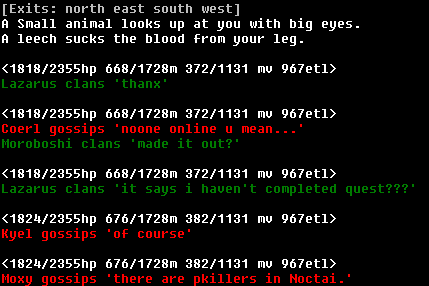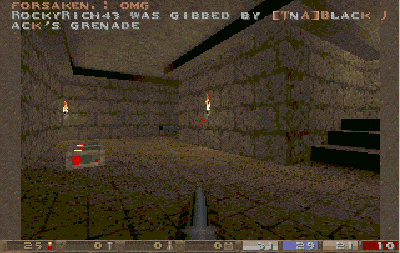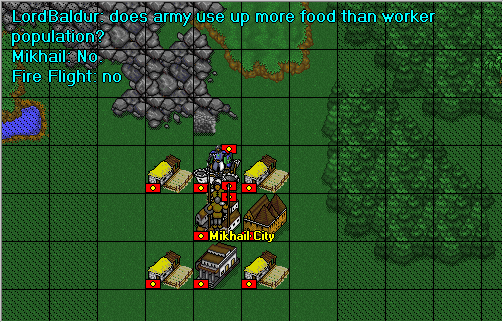Multi-player games are no longer the future. They are very much the present. It has become uncommon for a commercial game to ship without some form of multi-player option. And many times the game publisher provides an online "match-making" service to bring players together. Even when the publisher doesn't provide this directly, there is usually a commercial gaming service, such as IGZ, WON or TEN, that does.
This brings players from all across the world together in a way that has never before been possible. And all these multitude of players have one thing in common: They are there to play your game.
However, barring adequate inter-player communication options, that's all they will ever have in common.
[size="5"]If You Bring Them, They Will Talk
Multi-player computer games bring the computer game back to its seemingly abandoned parlor game roots. For most of its history (with only a few exceptions) the computer game has been exclusively single-player. This is the opposite of the "normal" game sold in stores, which is intended as entertainment for two or more players.
Which means computer games are finally becoming, for the first time in their history, a means of social interaction. Today's multi-player games are a medium by which friends and acquaintances gather and spend time together.
Social events require more than just a crowd, however. The people in the crowd have to talk to each other and get to know each other. Fortunately, it doesn't usually take a lot to get people to talk.
The simple urge to talk to other people and relate and share experiences is obviously a powerful draw, judging by the continued popularity of "talker" MU*'s and even Internet Relay Chat (IRC). Most talkers MU*'s are entirely text-based, driven by the role-playing descriptions (and out-of-character chatter) of the different players as they interact in the loose framework of the MU*. IRC works very much the same way, but without even the minimal structure of a talker MU*.
[size="5"]Is it the Game or the Players?
A key feature of the previous examples, MU*'s and IRC, is that a community develops simply because the people talk to each other. The game (or chat channel) serves only as a catalyst for the interaction.
Because the players talk to each other, they meet, they swap secrets and tips and tricks, and, in the process, they develop ties of familiarity and even friendship. More importantly, from a strictly commercial-mercenary point of view, because of these ties they come back! Even if they stop playing the game, they'll continue visiting to see how the game is developing and catch up with their friends.
The players keep coming back because they know the people there. I'm sure most of us remember the sitcom "Cheers." Sure, there were other, possibly better, bars in Boston, but the regulars kept coming back because these were the people they knew. This was their family. Never underestimate the social benefits inherent in being "where everybody knows your name."
So I submit that even though the quality of the game provides the initial "hook," the quality of the inter-player communication--within the game or it's match-maker lobby--determines whether a stable community of players develops.
[size="5"]Communication Options
There are many types of communication possible: large group chats, small group chats, player-to-player chat, notes, and more. Not all of them are viable for all games and some of them are more effective than others for building community among players.
[size="3"]General Chat
By "general chat" I refer to one or two large forums that are (possibly optionally) visible to all players logged into the game. All chatter is scrolling text and is ordered simply by when it arrives at the player's console. Whatever a particular player chats is identified by his name.
There is no such thing as privacy in the general chat forum. Anything said is open to comment from anyone else also logged in (and paying attention). This can make for some interesting/amusing/infuriating banter.
[size="3"]Person-to-Person Private Conversation
Exactly the opposite of the general chat forum is the person-to-person conversation. Two players swap messages in a private conversation, whether a scrolling chat like IRC or popup messages like ICQ. This is the most private communication option.
While general chat introduces players to each other, private conversation allows them to get to know each other. It also allows for private planning sessions between 2 players.
[size="3"] Small-group Chat (Chat rooms)
The small-group chat is a more condensed version of the general chat forum. Usually reduced to a small number of participants (5-20 players), the small group allows for both general discussion and semi-private conversation. Small-group chat expands the intimacy of the private conversation to include a select number of others.
Generally, the only relevant small-group chatting that's likely to occur in a game is between teammates.
[size="3"]Note System
Not all communication has to be immediate. Players will want to leave messages for other players that are not online at the moment. If you offer a global note forum, players will often use it to engage in long discussions of dubious worth, but there will also be some legitimate use made of it.
Unlike the various chat communication options, the note system does not need to claim screen real estate all (or even most) of the time. A separate form or screen can handle the note functions. If the player wants to check the notes, she opens the form and does so. If not, she doesn't.
[size="5"]Protection from Unwanted Communication
Not everything that everybody says is going to be appreciated by everybody else. Besides the obvious cases of "I can't stand him!" and "Everything she says annoys me..." there are more insidious uses of communication to intimidate and harass. While the game should certainly provide some kind of "Code of Verbal Conduct" that gives guidelines for what is appropriate and inappropriate communication, it also needs to provide enforcement of the code and, more importantly, provide the individual players the means to protect themselves.
[size="3"]Code of Verbal Conduct - with Enforcement
The most obvious, and simplest, solution is to have a posted "Code of Verbal Conduct" or "Community Guidelines." These guidelines should spell out what is explicitly disallowed, such as flaming, sex-related talk, and so on.
For example (from the game Paintball NET):
[bquote]Since Paintball NET is played by people of all ages, backgrounds, religions, and nationalities, it is expected that the players will refrain from speech that is deliberately inflammatory, excessively vulgar, and/or personally derogatory. In other words: No flaming and keep the trash talk to a minimum.[/bquote]
The problem, of course, is that a posted guideline is just so many words unless there is some form of enforcement to back it up. This enforcement needs to be automated as much as possible, but there is no substitute for a good moderator. The "teeth" of the moderator will need to include the power to silence, kick, and (at least temporarily) ban an offending player. And since the violations may not be occurring in a public forum, the moderator will need some kind of monitoring mode which shows all communication received and sent by a player.[size="3"]"Ignore" Support for Chat and Notes
In addition to moderators, the game should also provide the means for the players to fend for themselves. Allowing the player to ignore (and un-ignore) other players at will accomplishes this nicely. If the game provides a note system, then the ignore feature should also cover notes sent by the ignored player.
Ignoring another player should be as simple as possible. Either a prominent button or a right-click menu option.
On the other side of the fence, the ignored player should be made aware of the player ignoring her. In my experience, this needs to happen only on direct messages.
[size="3"]Language Filter
Another feature the game might provide, depending on the nature of the game and its players, is a language filter. This would be an optional feature that the players themselves would turn off or on. Like the ignore, this is a player-empowerment feature. Since no list of "forbidden words" will ever be complete, it is probably necessary to include a means of adding words to the filtered list. Being able to point-and-click offending words and have them immediately filtered makes use of this feature as easy as possible.
[size="3"]Anti-Spam Controls
"Spamming" or "flooding" the communication channel by a single player is another serious problem that must be dealt with. Besides the annoyance factor to the affected players, it can chew up bandwidth needed by the game. Having a moderator will help keep this down, and ignore options help as well, but the game must have built-in anti-spam controls.
A simple method of spam-control involves tracking how much communication bandwidth is used by the player over a 15 second period. If the player exceeds a set limit, then the game forces him to be silent for a short time, such as 5 minutes.
[size="5"]What should you have in your game?
All of this is well and good, you say, but how much of this do you need to support in your game? Obviously, games such as Quake have been and continue to be incredibly popular with little more than a mechanism for swapping pre-recorded insults. So it should be pointed out that not every game requires every communication option.
[size="3"]Use of a Lobby
A "lobby" for the online portion of your game can carry the weight of the inter-player communication burden. This leaves the actual game free to provide only the bare essential communication options, such as taunting and team chatter.
The lobby can likely devote as much screen real estate as necessary to any and all of the different communication types: general chatter, small groups, person-to-person, and so on. After all, that's what the lobby is for: bringing players together.
[size="3"]Teams Having Their Own Forums
If your game supports teams of players, you should definitely consider including specialized team-only forums. Primarily this will mean giving the team its own "small group chat" forum and, possibly, a note system that is specific to team.
A separate note system for teams might be a bit of a luxury, depending on the game in question, but a dedicated team chat forum should be mandatory.
[size="3"]Scrolling Text Considerations
An important consideration is how much screen real-estate should be devoted to the display. The number of visible lines depends on the number of people in the forum who are attempting to maintain a conversation. The more people talking at once, the more lines must be visible so that the player can see what he's interested in and be able to read it before it scrolls off the top of the screen.
For a general chat forum, the entire screen might be necessary simply from sheer volume. On the flip-side of that, a two-person private chat could probably get away with only 2 or 3 visible lines. Or maybe even adopt the ICQ format and use small pop-up windows with each message.
It's possible that your game simply cannot afford to allocate space exclusively to displaying in-game chatter. In that instance, consider where the text could be combined with some other on-screen element. For instance in Quake, the text overlays the main display for 4 lines of text at the top of the screen. In our game, Artifact, we built in the option for game messages and player chatter to overlay the main map. Both of these allow for a more "heads up" interface. The player can read the chat immediately and respond at his leisure.
Another consideration is the range of characters to allow in the text. The standard ASCII character set is probably sufficient (character values 32 to 127), but it might prove interesting to allow characters outside this range. Earlier versions of Quake allowed players to use non-standard characters in their names and in their chat. The players found creative uses for the different "block characters" to create text "banners" that would scroll by. Unfortunately, however, they also used them in their player names making it difficult for system administrators to kick them off when they became disruptive.
[size="3"]"Buddy" Lists
When the potential number of players online at any time is large (more than 100 or so), it can be difficult for players to see if the other player or players they wish to talk to are also online. Allowing the player to setup a "buddy list" can alleviate this problem. The player immediately knows if her "buddies" are online or offline and can easily talk to one or more of them if she wants.
Since the buddy list applies only within the game, the implementation can be kept simple. It's feasible to limit the functionality to simply displaying online/offline with an option to open up a person-to-person chat session and/or send simple messages. The feature list doesn't need to compete with ICQ to be extremely useful within the game.
[size="3"]Voice Communication
While voice communication is becoming more and more viable, it's bandwidth requirements are still quite high and the nature of voice communication limits it to only a small number of participants. If you have more than 4 or 5 people in a group talking at the same time, it essentially ceases to be a conversation and becomes a cacophony. In a scrolling text scenario, however, it's not uncommon to have hundreds of people conversing on a variety of topics and even engaging in semi-private side conversations.
Voice communication provides an excellent in-game team-coordination feature, as shown by the success of the Roger Wilco product (http://www.resounding.com) and Multitude's online game, Fireteam.
Arguably the best small-team communication option possible, voice communication is, unfortunately, not a method of meeting and interacting with a lot of new people. So voice communication can augment an online community, it does not create it.
[size="5"]Conclusion
Communication is the heart of a community. People who talk to each other become friends and/or rivals. They know and are known on the game. They are a recognized presence. And that will keep them coming back.





